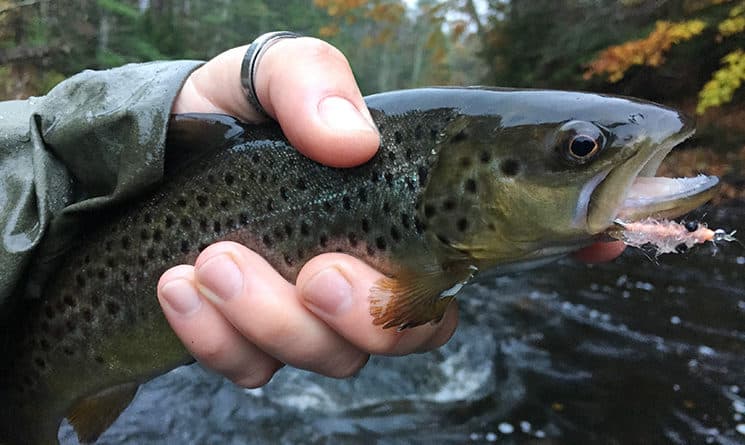For many, mid-October marks the end of trout fishing season in New Hampshire, which to casual anglers means a segue off the rivers and streams and into the long, cold winter. But for those with a severe addiction to the sport, there are opportunities to catch fish year-round in local waterways.
N.H. Fish and Game typically stocks rivers in the spring, with occasional fish released in the fall. But anglers have asked for more chances to fish throughout the year, and in 2000, the state opened up Dover’s Cocheco River for year-round fishing. Since then, the program has grown and fishing opportunities in southern New Hampshire have increased, thanks in part to the Three Rivers Stocking Association (TRSA), a group of avid anglers who help keep local rivers flush with fish.
The nonprofit group raises funds to purchase trout that are used to stock Seacoast waters in the fall. TRSA began its re-stocking efforts in 2008, picking up where the fishing group Great Bay Trout Unlimited left off — GBTU stocked local rivers from 2000 to 2007, but stopped due to funding issues. The trout hold over through the winter and provide angling opportunities when snow and ice typically put fishing season on hold. The Cocheco is one of many local rivers open for year-round fishing; others include the Lamprey, the Isinglass, and, most recently, the Exeter River.
“Winter fishing to me is a unique experience; I like the challenge that it provides,” says Rick Hutchins, a TRSA member. “Dealing with the elements like snow, ice, cold water, and frigid air temps all make it much harder to catch fish in the winter, but much more satisfying when you do.”
Part of the challenge is that fishing in the winter is strictly recreational. Anglers must release any fish they catch. But the trade off is worth it. This provides a huge additional window to fish for trout — almost six full months —straight through winter and into spring. And when trout season begins again in April, anglers can once again take their catch home.
What is winter trout fishing all about? Well, it’s cold. Damn cold. You need to be well-equipped for the elements; getting to the best spots requires wading through rivers. You will get wet, water temperatures can quickly drop almost to freezing (ice is common on the periphery of the streams), and you often find yourself standing in an icy pool. Educate yourself; know the signs of hypothermia and how to stay safe on the water.
However, the benefits are pure and simple. You’re fishing, and not working. You’re probably alone in wonderful silence, with only the sound of the rushing water and the quiet sigh of nature.
“The scenery you get to enjoy is all part of the experience. Snow on trees and other parts of the landscape provide some great photo opportunities. Fishing while it’s snowing out is very tranquil and it feels like you are the only person in the world out there. Finally, the colors on the trout are spectacular in the winter,” Hutchins says.
Cold weather fishing is also highly technical. Don’t expect to catch a lot of fish, but when you do, you know you’ve got skills. Some years are better than others for late-season and winter fishing — temperatures, water levels, and snow and ice cover all play a role in shaping the stage for angling. The best time to fish is in November, when there’s a deep chill in the air but still strong, warming sunshine and (hopefully) no snow and ice. Some die-hards fish in January.
Fish are typically attracted to smaller flies like midges, but may also react to huge high-protein morsels they just can’t resist, such as wooly buggers or small spinners. They don’t like to move fast, so a slow and deep presentation is usually the best, which is fine because your arms are usually tucked in your jacket to preserve your own thermal energy. Access points are limited by ice, so fishermen have to find areas of exposed water to execute accurate casts. The water is crystal clear and you are extremely visible to fish. It’s a real angling challenge and not for the everyday casual fisherperson.
For many, it’s too much. The bitter cold, screaming winds, and the fact that, after you land a beautiful, tasty trout, you immediately have to let it go, makes winter trout fishing seem like a folly. But it’s a true New England pastime, a unique and challenging activity that only the strongest (and perhaps craziest) are willing to tackle.
For a complete list of rivers and streams with year-round fishing, visit N.H. Fish and Game’s website: wildlife.state.nh.us/fishing/
To contact Rich Collins, visit https://www.thirstproductions.com/.

